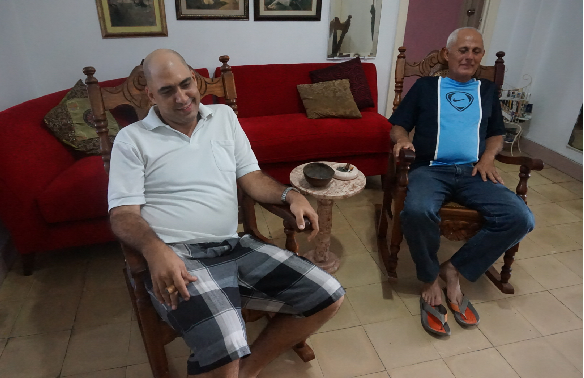‘Casa Particulars’ in Havana, Cuba
August 29, 2017
Walking down 7th street in Central Havana, Cuba on a hot 87-degree day, I stumbled upon a brightly colored house, which caught my attention. The cheerful yellow and white crown molding invited me in. By the entrance, there was a dark blue “casa particular” sign in the window. A group of Cubans was sitting outside the house playing dominos, waving their hands, telling us to come see their home. In the house, there was a setup that looked like a hotel just smaller. There was a desk that said check in and check out. To the left, there was a modern American door tightly locked that made me wonder, what’s on the other side?
“Casa particulars” have been around since 1997, and they are the equivalent of an Airbnb in the United States. Airbnb has only existed since 2007 and allows people to long- or short-term rent their own properties to visitors. In Casa Particular Cuba, Carlos Rodriguez said, “Casas Particulares are basically Bed & Breakfasts but breakfast is not always offered and it usually comes at an extra price.” That extra price is usually between 5 and 10 CUC. Considering most Airbnb places in the United States don’t serve breakfast, in Cuba, they really are charitable, especially when food is scarce. Legally licensed ”casas” are identified by the blue Arrendador Divisa sign, which typically hang outside the home. These signs look like an upside-down anchor. There are also red Arrendador Divisa signs, however, according to cubanpesos.com, these signify rooms that are only rented to Cubans and paid for in pesos.
“Casa Particulars” in Spanish translates to “private homes” in English. Interestingly enough, “casas” only allow one room per guest, and only allow two people to stay together if they are legally married. Roberto Moranteis, who owns his own “casa” said, “I really wanted to open my home due to the financial freedom.” He just got licenced to open his own place less than five years ago, and already made more money than he has in his entire life. The average paycheck Cubans get for jobs per month is about 20 CUC or $20. What makes his hostel stand out from others is he knows how to make Creole food. Moranteis’ “casa,” Hostal Loretta, is located in central Havana and a hot spot for college students.
Kenia and her son Reinaldo use their house to rent out five rooms, which have different themes and sizes. They base their price on what room you choose. The smallest room is 10 CUC per day, and the master bedroom, is 40 CUC per day. These prices are pretty high considering the fact most “casas” in Havana average from 15 to 35 CUC per day. Each room has its own theme including California, Cuba, Italy, London and Miami. Reinaldo also pointed out that he re-configures the prices due to high and low tourist seasons. According to Reinaldo, high tourist season is generally the winter and spring months from December to April. While the low season tends to be in the summer and fall months primarily because of bad weather. He also provides laundry service for his guests if the tourists buy the soap, which I discovered was a challenge to find on the island.
Raymond Jr., is a Cuban native who lived in his same house his entire life. To get in the “casa” business he saved money for renovations to fix his house and make it suitable for guests. Since Raymond Jr. worked in construction since he was 17, he knew that fixing his house would be an easy job. It took him a little more than six months to fix his place. He started with the kitchen, the tackled on the bathroom, and installed air conditioning in the bedrooms. He didn’t speak English when they opened up, but his wife Carmen did. With the combination of American clientele and his wife, he began to learn English. He still struggles, but he says he wants to continue learning now that he is 34 years old. “If you renovate, people will want to stay here. I also offer two free meals, and laundry.”
In the United States, renting an Airbnb is affordable and simple. In Cuba, it’s different. If you want a more upscale place you must go through two websites: havanacasaparticular.com or mycasaparticular.com.
“A casa particular is difficult to own because it’s expensive,” said Raymond Jr, who also said 49 percent of his income goes to taxes. Most “casa” owners have to pay a huge monthly tax to rent out rooms, some having to pay 300 CUC per month. “Casa” owners have to pay this tax no matter if they have guests or not. After taxes and fees, a landlord like this earns a net income of about $17,000 per year or more, putting them solidly into the upper middle-class category in Cuba. This is equivalent of earning more than $85,000 a year in the U.S.
Cubans and Americans run their businesses completely differently. In the US if you run your own Airbnb, you don’t get taxed monthly or yearly. However, you do get taxed on how long guests stay with you.
When visiting Cuba, tourists have two different options on where they would like to stay; a traditional hotel, which would be the obvious choice, or a “casa particular”. With Cuba being an impoverished country, why not get some real Cuban culture and explore what great wonders a “casa” can offer you? Casa particulars have only been existent 1997, and since then many people Cubans have renovated Many natives running casas are great at giving out advice when it comes to places to eat and visit, and explore. In this low incomed state why not help out families in need that are giving their hearts to have people from all around the world come to visit.



